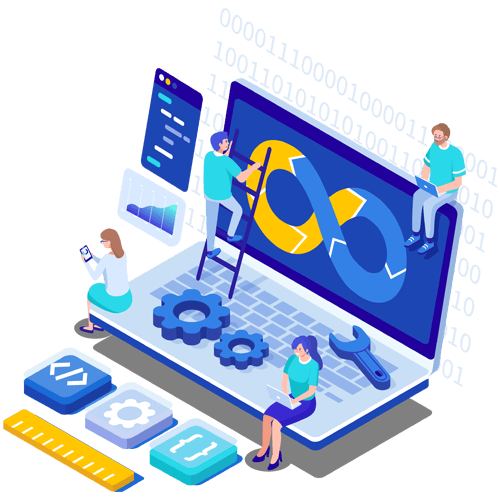Devops Engineer with IT Security
DevOps is a culture which promotes collaboration between Development and Operations Team to deploy code to production faster in an automated & repeatable way. The word ‘DevOps’ is a combination of two words ‘development’ and ‘operations.’ In our course of Devops Engineering candidate will learn about the process of devops and devops tools that will complete the cycle through CI/CD with live projects. Course Will be started from basics to advance level.

Session 1: DevOps Foundations
DevOps is not a framework or a workflow. It’s a culture that is overtaking the business world. DevOps ensures collaboration and communication between software engineers (Dev) and IT operations (Ops).
Session 2: Learning Ansible
Automation tools can help transform unwieldly IT tasks—managing zero downtime rolling updates, for example—into something far more manageable. In this course, explore Ansible, an easy-to-use IT automation engine.
Session 3: Learning Puppet
Puppet is a powerful set of tools for automatically managing your infrastructure so that it is always in the desired state. With this tool, the job of server administration becomes easier and faster—and your systems become more reliable.
Session 4: Learning Chef
You can transform infrastructure into code using Chef—a powerful platform that provides automation solutions, a development kit, and more.
Session 5: Learning Docker
Docker is the next step beyond virtualization. A Docker image contains everything it needs to run, independent of the Linux server on which it lives: a copy of the operating system, a database, code, configuration files, dependencies, and so on.
Session 6: DevOps Foundations: Continuous Delivery / Continuous Integration
Continuous delivery is one of the major DevOps practice areas. By continuously building, testing, and delivering your code, you can reap huge stability, speed, and flexibility benefits.
Session 7: Learning Jenkins
With Jenkins, you can automate build management, continuous integration and deployment, testing, resource management, monitoring and reporting, and much more.
Session 8: Learning Software Version Control
This course is a gateway to learning software version control (SVC), process management, and collaboration techniques. Author Michael Lehman reviews the history of version control and demonstrates the fundamental concepts.
Session 9: DevOps Foundations: Lean and Agile
By applying lean and agile principles, engineering teams can deliver better systems and better business outcomes—both of which are crucial to the success of DevOps.
Session 10: Lean Technology Strategy: Running Agile at Scale
If you’re aiming to implement agile at scale, then this course can help by letting you know which pitfalls you may encounter and providing techniques for successfully managing a transformation.
Session 11: Lean Technology Strategy: Building High-Performing Teams
Lean teams are nimble and diverse. They include product managers, developers, and operations specialists, who may only work together for a short time.
Session 12: Lean Technology Strategy: Starting Your Business Transformation
Lean management focuses on building your organization’s capability, innovating your ways of working, and improving the quality of your business outcomes.
Session 13: Lean Technology Strategy: Moving Fast With Defined Constraints
Lean principles—which center around making processes tighter and more efficient—can help teams work smarter in a variety of different industries, including technology.
Session 14: DevOps Foundations: DevSecOps
Security is a major concern in the DevOps world. There is a constant push for companies to move more quickly, and security teams struggle to keep up with testing.
Session 15: DevOps Foundations: Infrastructure as Code
By automating configuration management, you can make your organization’s systems more reliable, processes more repeatable, and server provisioning more efficient.
Session 16: DevSecOps: Building a Secure Continuous Delivery Pipeline
Over the past several years, information security has struggled to keep up with the fast-paced DevOps movement. DevSecOps—an extension of DevOps—aims to remedy this by embracing security as an essential part of DevOps culture.
Session 17: DevSecOps: Automated Security Testing
Security testing is a vital part of ensuring you deliver a complete, secure solution to your customers. Automating the process can ensure testing is always part of your software delivery workflow, and can help testing keep pace with continuous integration and delivery (CI/CD) pipelines.
Session 18: DevOps Foundations: Monitoring and Observability
Monitoring is a key practice area of modern operations. In this course, explore techniques and tools for monitoring from a DevOps mindset.
Session 19: Learning the Elastic Stack
The Elastic Stack, formerly known as the ELK Stack, offers powerful open-source products that you can use to ingest your data, analyze it, and visualize it with charts and graphs.
Session 20: Learning Nagios
Nagios is an industry-standard, open-source solution, which makes Nagios a great choice to get started in network monitoring and administration.
Session 21: Graphite and Grafana: Visualizing Application Performance
Get better insights into your back-end performance—whether your applications run on site or in the cloud. StatsD, Graphite, and Grafana are three popular open-source tools used to aggregate and visualize metrics about systems and applications.
Session 22: DevOps Foundations: Site Reliability Engineering
Site reliability engineering (SRE) is an emerging paradigm in DevOps. The biggest names in tech—companies like Google, Netflix, Microsoft, and LinkedIn—all use SRE.
Session 23: Learning Kubernetes
Kubernetes is a core tool in DevOps, and is the world’s most popular open-source container orchestration engine. It offers the ability to schedule and manage containers (Docker or otherwise) at scale.
Session 24: Kubernetes: Cloud Native Ecosystem
The Cloud Native Computing Foundation (CNCF) provides professionals with an assortment of cutting-edge tools and platforms. If you’re unfamiliar with CNCF tools and want to learn how they can help you, then this concise course is for you.
Session 25: Kubernetes: Microservices
Build scalable and reliable microservices with Kubernetes. Kubernetes is a popular DevOps tool for managing containers at scale. Microservices allow developers to deploy individual app components, enabling continuous integration and increased fault tolerance.
Tanuj
Instructor
Tanuj Chugh, an adept and prominent trainer and speaker have been associated to education sector from many years and have an experience of more than 9 years of live industry projects based on latest technologies like Virtualization, Cloud Computing, AWS, Google Cloud, Azure, Linux & Windows Servers, Network & Security etc. Upholding the responsibilities of delivering in-house and online training to the corporate employees, clients and individuals.
Ready to get started?
Get in touch

